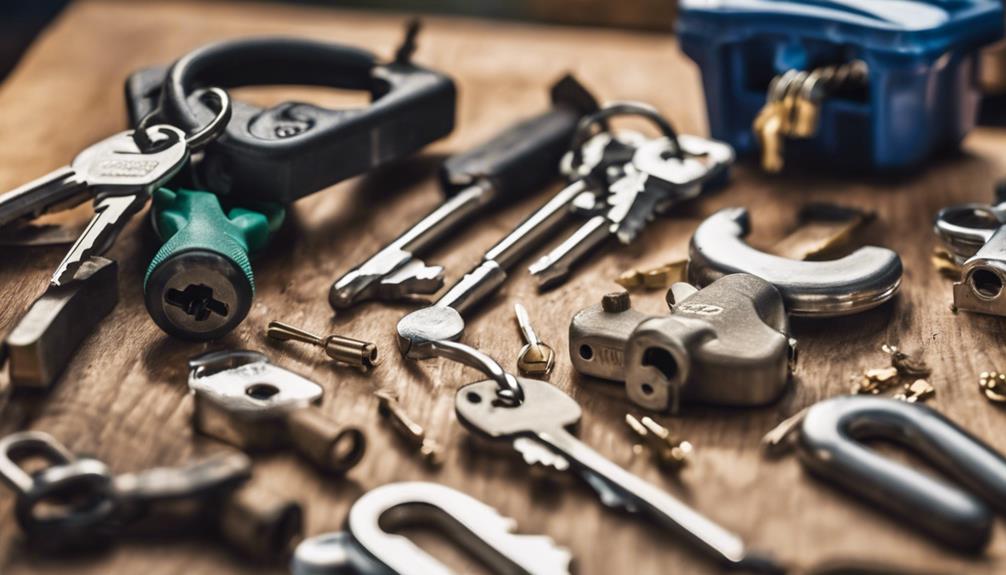To re-key automotive locks, start by gathering necessary tools, including a re-keying kit and screwdrivers. Remove the lock cylinder from your vehicle using a screwdriver. Disassemble the cylinder by taking off the retaining ring and tumblers. Replace worn pins with new ones that match your desired key. Once you've reassembled the cylinder, test it with the new key before reinstalling it. Keep in mind that patience is key, especially if you face stubborn pins. There's more to explore about tools, techniques, and safety tips to make this process smoother and more effective.
Key Takeaways
- Gather necessary tools, including a re-keying kit, screwdrivers, and pliers before starting the re-keying process.
- Remove the lock cylinder from the vehicle door or ignition using a screwdriver.
- Disassemble the cylinder by taking out the retaining ring and tumblers to access the pins.
- Replace old pins with new ones that match the profile of your new key for proper alignment.
- Reassemble the cylinder, test it with the new key, and securely reinstall it in the vehicle.
Understanding Automotive Locks
Have you ever wondered how automotive locks actually work? Understanding the mechanics behind them can empower you to help others with their car security needs.
Automotive locks typically operate using a system of pins and tumblers. When you insert the correct key, the pins align, allowing the cylinder to turn and open the door. If someone loses their key or wishes to enhance their security, knowing how to rekey car locks becomes essential.
Common challenges during this process include dealing with worn pins or misalignment, which can complicate the rekeying procedure. Troubleshooting automotive lock issues can provide guidance on how to overcome these obstacles effectively.
Automotive lock rekeying is a process that changes the internal configuration of the lock so that it accepts a new key. This method is often more cost-effective than replacing the entire lock system.
When rekeying car doors, you'll need to disassemble the lock, replace the existing pins with new ones that correspond to the new key, and then reassemble the lock.
Being knowledgeable about automotive locks not only helps you tackle your issues but also equips you to assist friends, family, or clients with their lock challenges.
With this understanding, you can provide valuable service and promote safety in your community.
Tools Needed for Re-keying
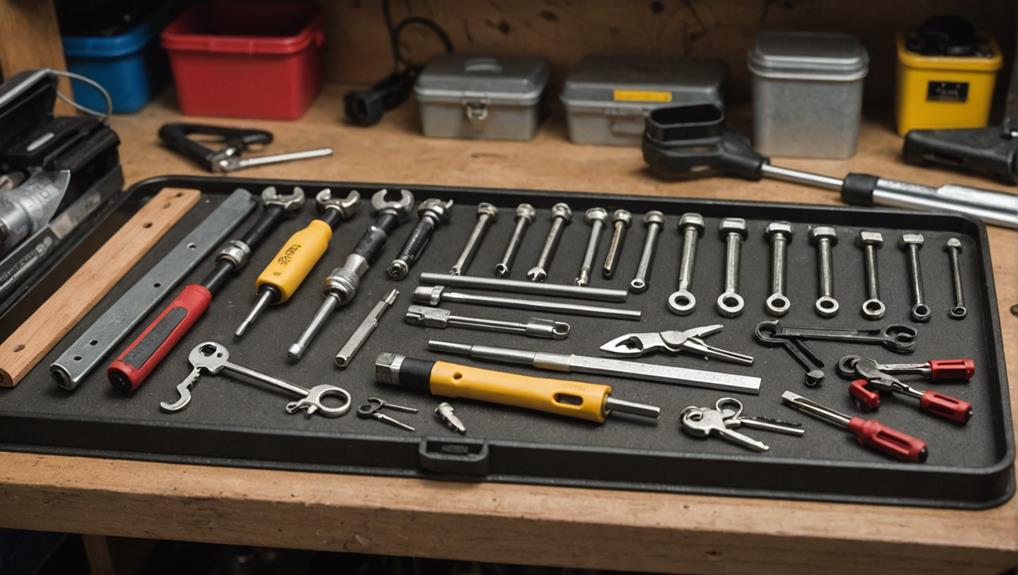
When preparing to re-key automotive locks, having the right tools at your disposal is essential for a smooth process. Start with a re-keying kit specifically designed for your vehicle's lock type. This kit usually contains new pins, a follower, and a key gauge to help you match the correct pins.
It's also important to evaluate the costs and potential risks associated with DIY versus professional re-keying, as outlined in DIY vs. Professional Re-Keying.
You'll also need a set of screwdrivers to remove the lock cylinder from your car. A pair of pliers can assist in manipulating small parts, while a clip removal tool helps detach retaining clips without damage.
Having a clean workspace with good lighting will make your DIY car lock rekeying task much easier.
If you're unsure about your abilities or lack the necessary tools, think about seeking professional automotive locksmith services. They've specialized equipment and expertise to handle the job, ensuring your locks function properly and securely.
Whether you choose to tackle the project yourself or enlist help, being equipped with the right tools and knowledge will make the re-keying process more efficient and rewarding.
Assessing Your Vehicle's Lock System
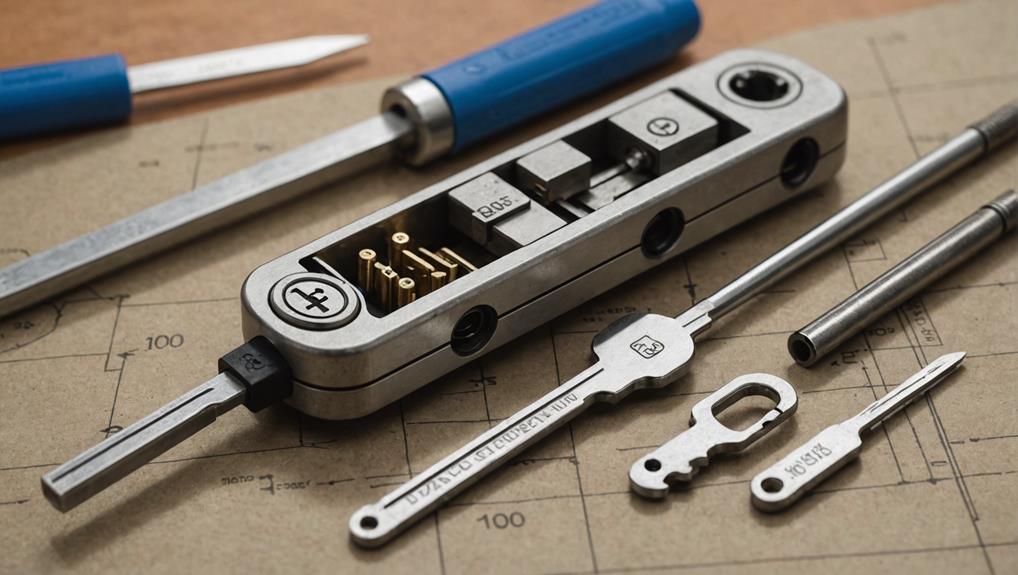
Before you start the re-keying process, it's important to evaluate your vehicle's lock system. Take a moment to examine the condition of your locks. Look for any signs of wear or damage, like rust or broken components. A well-functioning lock is essential for guaranteeing the safety of the people you serve.
Additionally, consider exploring keyless entry options as they can enhance the security of your vehicle.
Next, check how smoothly the key turns in the lock. If it feels stiff or doesn't engage properly, it might indicate internal issues. You want to confirm that the lock is in good working order before you move forward.
Also, consider the type of lock system your vehicle uses. Is it a standard pin tumbler lock, or does it have a more advanced electronic system? Understanding the specifics will help you determine the best approach for re-keying.
Lastly, think about how often the locks are used. If they're frequently accessed, they may wear out faster. By thoroughly evaluating your vehicle's lock system, you'll be better equipped to provide a secure solution that benefits you and those you serve.
This careful evaluation sets the stage for a successful re-keying process.
Step-by-Step Re-keying Process
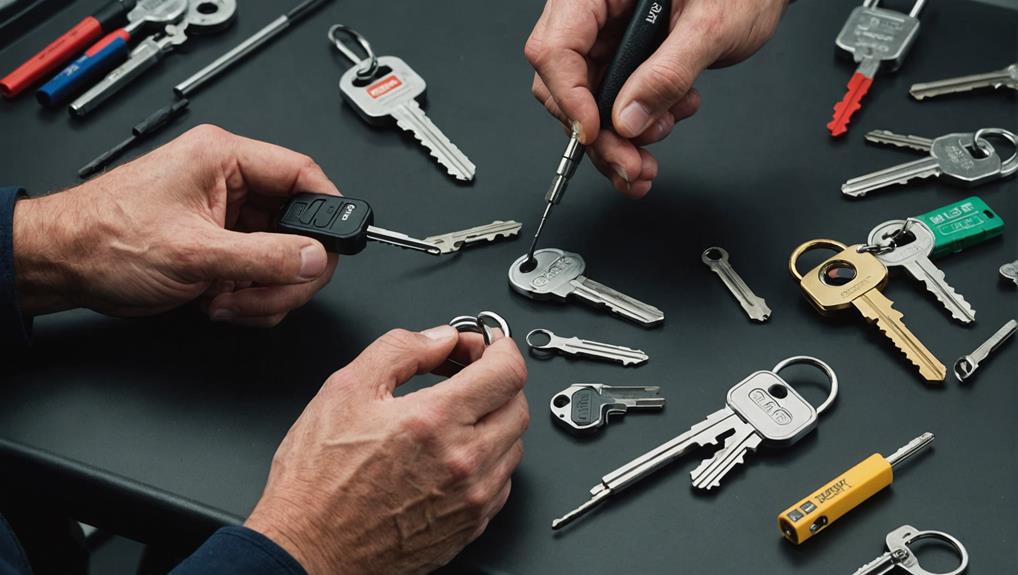
To re-key your automotive locks, you'll need specific tools to get started, including specialized equipment like key extractors and plug followers.
Once you've gathered everything, you can follow a straightforward procedure to change the lock mechanism.
Understanding the essential tools for professional locksmiths will guarantee you have everything you need.
Let's go through the necessary tools and the step-by-step process to make it easy for you.
Tools Needed for Re-keying
Re-keying automotive locks requires a specific set of tools to guarantee the process goes smoothly and efficiently. Having the right equipment not only saves time but also confirms that you can provide a secure solution for those who rely on you.
Here's what you'll need:
- A set of lock picks: These will help you access the lock mechanism without damaging it.
- A re-keying kit: This includes the necessary pins, springs, and a follower, tailored to the type of lock you're working on.
- A screwdriver set: You'll need various sizes to disassemble the lock housing and reassemble it after re-keying.
Equipping yourself with these tools empowers you to make a difference in someone's life, enhancing their peace of mind and security.
When you re-key a lock, you're not just restoring access; you're fostering trust and safety. Your ability to serve others through this skill can have a profound impact, making it essential to have the right tools on hand.
Step-by-Step Procedure
When you're ready to re-key an automotive lock, following a structured approach can make the process straightforward and efficient. Start by gathering your tools and making certain you have the correct replacement pins for the lock.
Next, remove the lock cylinder from the door or ignition using your screwdriver.
Once you have the cylinder in hand, carefully disassemble it by removing the retaining ring and taking out the tumblers. You'll notice which pins are currently in place; take note of their sizes. Replace these pins with the new ones that match your desired key. Make certain each pin is aligned properly for smooth operation.
After reassembling the cylinder, test it with the new key to ascertain it turns smoothly. If it doesn't, you may need to adjust the pin heights.
Once you're satisfied with the operation, reinstall the lock cylinder back into the vehicle. Secure it in place, and double-check everything to make sure it's functioning correctly.
DIY vs. Professional Services
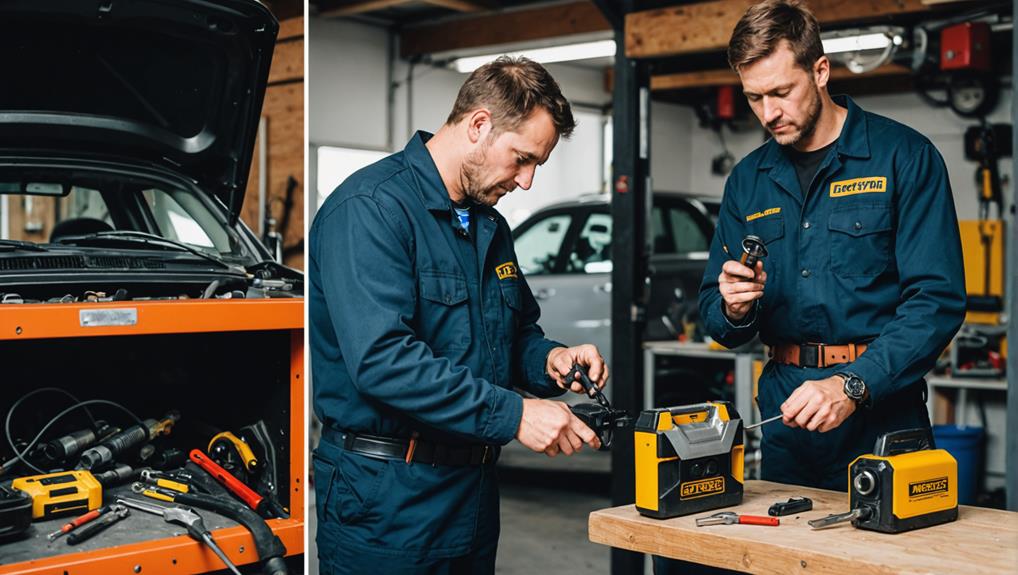
When considering whether to tackle re-keying your automotive locks yourself or hire a professional, think about your budget and skill level.
DIY might save you some cash, but it requires a certain level of expertise to avoid mistakes. To help you make a more informed decision, you can look into a detailed cost comparison between DIY and professional re-keying services detailed cost comparison.
On the other hand, professional services can guarantee a job well done, often at a higher cost.
Cost Considerations
Considering whether to tackle re-keying your automotive locks yourself or hire a professional involves weighing both costs and benefits.
If you choose the DIY route, you might save money on labor costs, but keep in mind that you'll need to invest in tools and possibly some training.
On the other hand, hiring a professional can guarantee the job is done correctly but may come with a higher price tag.
When making your decision, consider these emotional factors:
- Peace of mind: Knowing your locks are secure can alleviate anxiety.
- Time investment: DIY projects can consume valuable hours that might be better spent elsewhere.
- Long-term savings: A professional job could prevent future costs from mistakes.
Ultimately, it's about what suits your budget and needs.
If you're confident and have the time, DIY could be fulfilling and cost-effective.
However, if you want to guarantee everything's done right and quickly, a professional service may be worth the investment.
Balancing these considerations will help you make a choice that serves not only your wallet but also your peace of mind.
Skill Level Required
Re-keying automotive locks requires a certain skill level, and it's important to assess whether you have the necessary expertise. If you're someone who enjoys tackling mechanical tasks and have experience with locks, you might be confident in handling this project yourself.
However, it's vital to understand that re-keying involves intricate components, and even a small mistake can lead to issues down the line.
On the other hand, if you're inexperienced or uncertain about your abilities, it's wise to explore professional services. Professionals have the training and tools to guarantee the job's done correctly and efficiently. They can provide peace of mind, knowing your vehicle's security won't be compromised.
Ultimately, the choice between DIY and professional services depends on your skill level and comfort with the task. If you decide to go the DIY route, make sure to research thoroughly and gather the necessary tools.
Conversely, if you opt for a professional, look for a reputable locksmith who specializes in automotive locks to guarantee quality service. This way, you can serve not just yourself but also others by assuring their vehicle locks are reliable and secure.
Common Challenges and Solutions
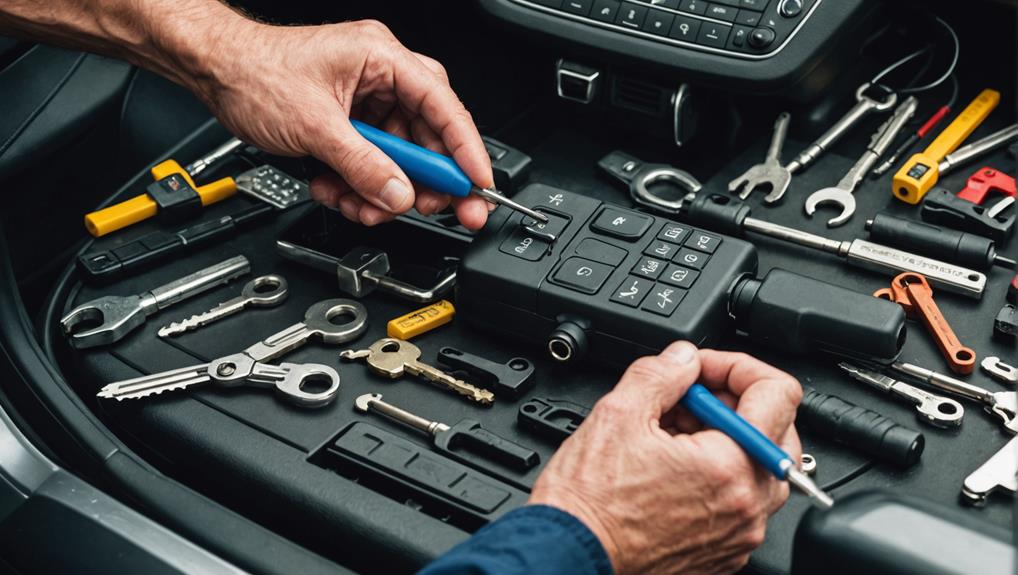
Often, you'll encounter challenges while re-keying automotive locks that can make the process frustrating.
These hurdles can sometimes feel overwhelming, but knowing how to overcome them can make your experience smoother and more rewarding. Having the right tools for lock re-keying, such as those listed in essential tools for DIY and pro lock re-keying, can greatly aid in addressing these difficulties.
Here are some common challenges you might face:
- Stubborn pins: Pins may not align properly, causing them to stick.
- Incorrect key cuts: If your new key isn't cut accurately, it won't work as intended.
- Lack of experience: If you're new to re-keying, you might feel unsure of where to start.
To tackle these issues, start by ensuring you have the right tools and a clear understanding of the lock mechanism.
Take your time with the pins; a little patience goes a long way.
If you're struggling with key cuts, don't hesitate to consult a professional locksmith for assistance or use a precision key-cutting service.
Safety Precautions to Consider
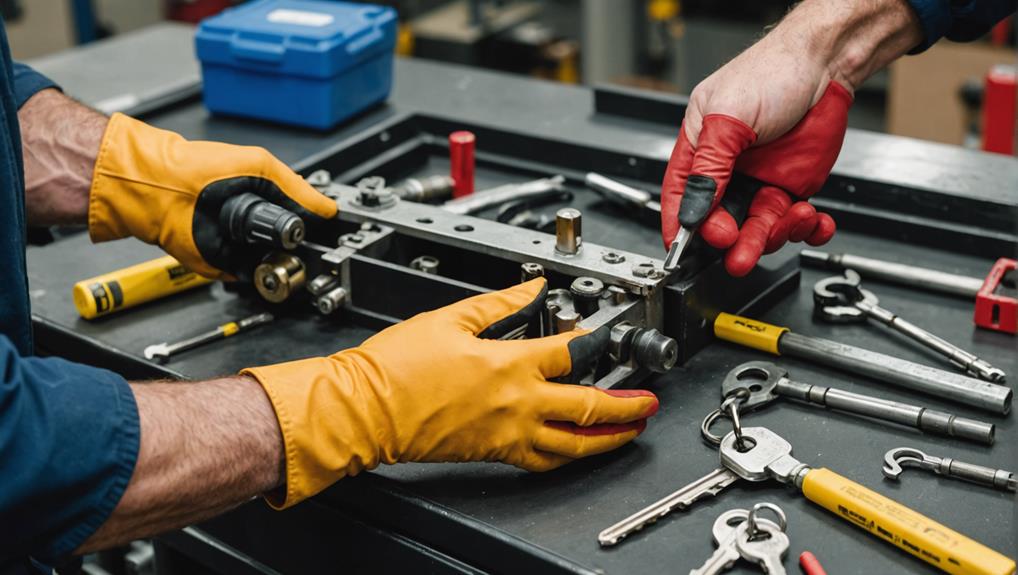
When tackling the challenges of re-keying automotive locks, it's crucial to keep safety in mind. You want to guarantee not only your safety but also the well-being of those around you. Here are some key precautions to take into account:
| Safety Precautions | Description |
|---|---|
| Wear Protective Gear | Use gloves and safety goggles to protect yourself from sharp edges and debris. |
| Work in a Well-Lit Area | Verify your workspace is well-lit to avoid accidents and assure precision. |
| Keep Tools Organized | An organized workspace reduces the risk of tripping or losing important tools. |
| Secure the Vehicle | Always confirm the vehicle is parked securely to prevent any rolling or movement. |
| Avoid Distractions | Focus on the task at hand to minimize mistakes and potential injuries. |
Maintenance Tips for Automotive Locks
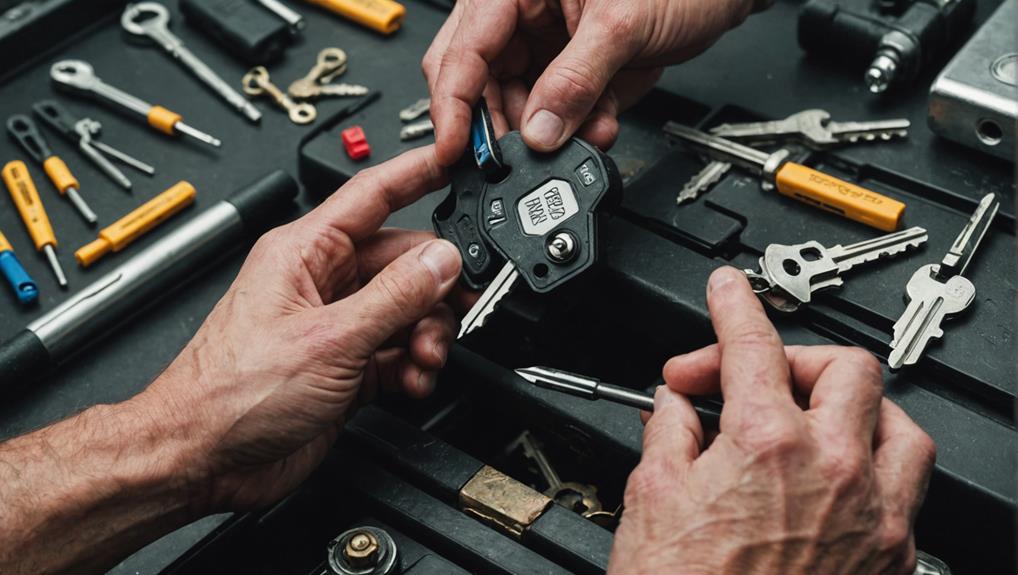
Maintaining automotive locks is essential for ensuring their longevity and functionality.
Regular maintenance not only helps in keeping your vehicle safe and secure for yourself and others who rely on it, but it can also be a proactive measure against the need for more complex procedures like lock re-keying, which can be beneficial if you lose your keys or experience a security breach.
Here are a few tips to help you care for your locks:
- Lubricate Regularly: Use a silicone-based lubricant to keep the internal mechanisms running smoothly. This prevents rust and debris buildup.
- Clean the Key and Lock: Wipe your key before inserting it into the lock to remove dirt. Occasionally, clean the lock itself with compressed air to clear out any dust or grime.
- Check for Wear and Tear: Regularly inspect your locks for signs of damage. If you notice any issues, address them promptly to maintain security.
When to Seek Professional Help
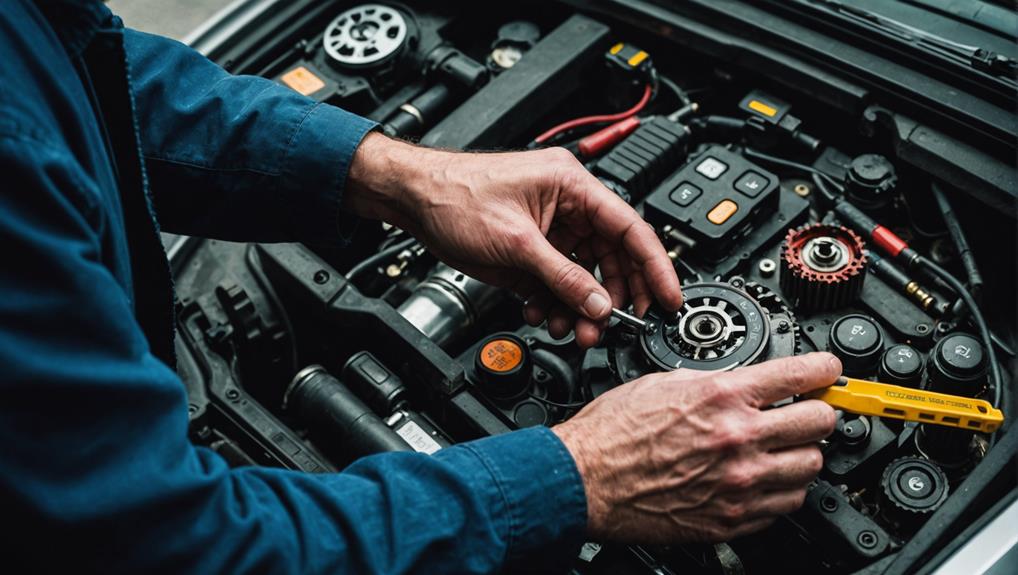
Regular maintenance can keep your automotive locks functioning well, but there are times when you might need to seek professional help. If you've tried re-keying your locks and faced difficulties, don't hesitate to reach out to an expert. They can provide the skills and tools needed to resolve issues that may be beyond your ability.
In some cases, the complexity of automotive lock systems may require specific expertise that only a professional locksmith possesses.
Consider seeking professional assistance if your keys are frequently getting stuck or if your locks are showing signs of wear. These problems can compromise not only the functionality but also the security of your vehicle.
Additionally, if you've recently experienced a break-in or lost your keys, a professional locksmith can help you re-key or replace your locks to guarantee your vehicle remains secure.
It's also wise to consult a professional if you're unsure about the re-keying process itself. They can guide you through the steps or handle the task completely, allowing you to focus on serving others.
Frequently Asked Questions
Can I Re-Key My Locks Without the Original Key?
You can't typically re-key your locks without the original key. Most locks are designed to work with a specific key, and without it, you might face challenges.
However, you can consider contacting a locksmith who specializes in this area. They can help you by either creating a new key or replacing the lock entirely.
Taking this route guarantees your locks remain secure while providing you with peace of mind.
How Long Does the Re-Keying Process Usually Take?
The re-keying process usually takes about 15 to 30 minutes, depending on the complexity of the lock and your experience.
If you're doing it yourself, having the right tools and a clear plan can speed things up.
If you're working with a professional, they'll likely have it done quickly and efficiently.
Just make certain you're patient and attentive, as this helps guarantee the job's done right the first time!
Will Re-Keying Affect My Vehicle's Warranty?
They say, "A stitch in time saves nine."
Re-keying your vehicle's locks typically won't affect your warranty, as long as it's done properly and doesn't compromise any factory-installed components.
However, it's wise to check your warranty terms or consult your dealer to guarantee you're covered.
Taking these precautions helps you serve both your vehicle's needs and your peace of mind.
Always prioritize professional help to maintain your warranty status.
What Type of Locksmith Specializes in Automotive Locks?
When you're looking for a locksmith who specializes in automotive locks, you should seek out an automotive locksmith.
These professionals have the training and tools needed to handle car locks, ignition systems, and keys. They can help with everything from making new keys to opening doors.
Make certain to ask about their experience with your specific vehicle make and model to guarantee you get the best service possible.
You won't regret choosing a specialist!
Are There Specific Brands of Locks Easier to Re-Key?
When you're considering re-keying locks, some brands definitely stand out for their ease of use.
Brands like Kwikset and Schlage often have user-friendly designs that simplify the process. You'll find their components are more accessible, making it easier for you to get the job done.
Plus, these brands usually provide clear instructions, so you won't feel overwhelmed.
If you want to help others, knowing these brands can make a real difference!
Conclusion
Re-keying your automotive locks can save you time and money, ensuring you're the only one with access to your vehicle. While it might seem challenging at first, with the right tools and a bit of patience, you can tackle this task yourself. Just remember, it's better to be safe than sorry—don't hesitate to call in the pros if you hit a snag. With a little effort, you'll have peace of mind and a secure ride in no time!

